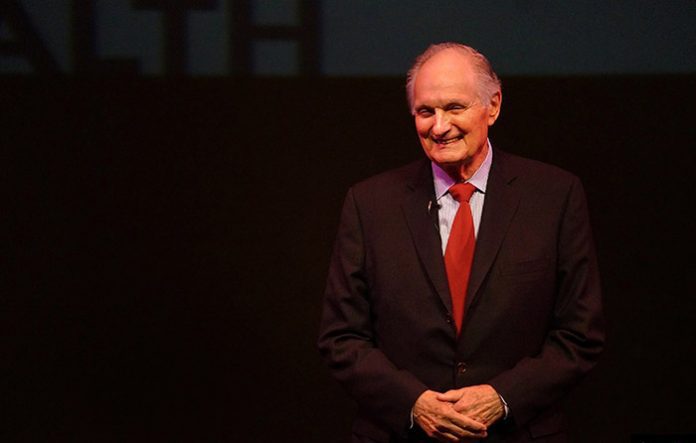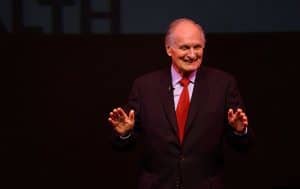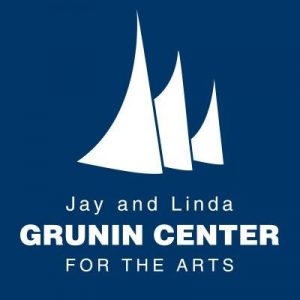
TOMS RIVER – Alan Alda, known for his iconic role as Dr. “Hawkeye” Pierce on MASH, has been focusing on a new role: educating scientists and doctors.
These are among the most educated people there are, and therein lies the problem. These people have become so engrossed in science and medicine, that they forget how to translate these things into layman’s terms, he explained.
The results are profound, and negative, he said. A doctor won’t be able to effectively communicate to a patient, and a scientist won’t be able to explain what’s going on in the natural world to people who can affect change.
This is why he started the Alan Alda Center For Communicating Science, located in Stony Brook University in Long Island. He spoke about it at the Jay and Linda Grunin Center for the Arts at Ocean County College, part of promoting his new book “If I Understood You, Would I Have This Look On My Face?” The subtitle is “My Adventures in the Art and Science of Relating and Communicating.”
He opened his talk with a story about how he became very ill on set while filming Scientific American Frontiers, a series he hosted that explained scientific concepts. The doctor knew exactly what was wrong with him. He needed to have a section of intestine removed, and the pieces reattached.
“The way the story ended: I lived,” he joked.
From being Hawkeye, he knew the technical term for the procedure, and said it to make the doctor laugh. But the doctor never used the technical term.
“He spoke in absolutely plain language, and that made an impression on me,” he said.
Medical and scientific professionals have a tendency to dig so deeply into their beloved area of expertise that they lose sight of how to talk about it to someone who does not have the same experience, he said.
To illustrate this, he showed some before-and-after videos of students at his center, talking about something that excited them. In the first take, their language was so bogged down in lingo that it was incomprehensible. After learning how to communicate more effectively, they were able to talk about their subject matter much more clearly.
“The public is not comfortable with science. They haven’t spent their life with it, like scientists do,” he said.

He also brought up volunteers from the audience to show this. One was asked to drum out a tune to a well-known song, and the audience had to guess it. Very few people knew it was “My Country, ‘Tis Of Thee.” The person drumming knew it too well to be able to communicate it.
Another volunteer was asked to pretend to be Alda’s mirror. This was an improv acting lesson. He moved his arms, and she had to mimic him at the same time. Then, they switched roles, and he had to mimic her. It was an exercise to show how to focus on someone and respond to them.
The response, he says, comes from something else that is lacking today: empathy. Being able to see where someone else is coming from will build bridges and let you understand so much more about them.
“It works in every piece of your life, not just science and medicine,” he said.
During the question and answer period, philanthropist Jay Grunin asked if playing Hawkeye influenced this move toward helping doctors be more relatable.
Not exactly, Alda said. “I don’t retain the characters I play.”
It has come from a desire for more empathy. “If I don’t get booster shots of empathy, I lose it,” he said. “The more empathetic I get, the less annoying other people get.”
Another viewer extended Alda’s analogy about how scientists have a love affair with science. “How do (scientists) ask the public out in today’s climate?”
“I really do think it’s important to establish trust,” Alda said. Any time a scientist talks down to someone, because they know more about an issue, it hurts their argument rather than helps it. Another example is that Florida officials are not allowed to say “climate change.” So, you have to discuss the issue without using any of the words that will turn them off.
“Someone managed to turn that word untrustworthy, and we have to build trust again,” he said.
Alda was warm and witty telling his stories, and threw in a good amount of humor. Professionals from a sponsor, Robert Wood Johnson Barnabas Health, also spoke about how important it is to connect with a patient.
Michael Mimoso, president and chief executive officer at Community Medical Center, said that when there’s a medical emergency, the patient and their loved ones are frightened. It’s important for medical staff to address those fears and make sure that the person feels cared for.
“Our physical well-being is tied to our emotional well-being,” he said.
The event raised about $14,000, which will be split between two nonprofits, Caregiver Volunteers of Central Jersey and Friends Health Connection.
“I am incredibly honored that Alan Alda is appearing at the Grunin Center to benefit Caregiver Volunteers of Central Jersey,” said Lynette Whiteman, the group’s executive director. “His latest book focusing on improving communication is vitally important to our mission. Every day we hear from families that need to have very sensitive and difficult discussions with their loved ones including concerns about their care and even the need to hang up their car keys. In tough times, t he ability to truly listen to another person and communicate with love becomes even more important.”
he ability to truly listen to another person and communicate with love becomes even more important.”
Roxanne Black, founder of Friends Health Connection, explained that she started her nonprofit as a freshman at Rutgers University, because she found that she had no network available to help her deal with her lupus.
The nonprofit reduced in strength while she fought lymphoma, but now she said she is using the proceeds to restart it.
“When the going gets tough, and you think there’s no way, miracles to happen and this evening is my proof,” she said.







